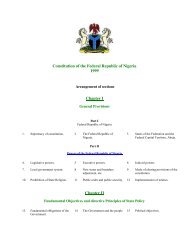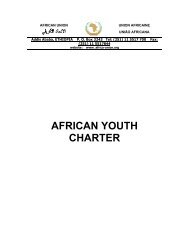Economic Recovery Growth Plan (ERGP) 2017-2020
This Medium Term Plan of the Federal Republic of Nigeria was designed to tackle the huge decline in the country’s economy since her shift from agriculture sector to crude oil and gas sector in the late 1960s. The plan’s objective includes restoring growth, investing in citizens and building a globally competitive economy.
This Medium Term Plan of the Federal Republic of Nigeria was designed to tackle the huge decline in the country’s economy since her shift from agriculture sector to crude oil and gas sector in the late 1960s. The plan’s objective includes restoring growth, investing in citizens and building a globally competitive economy.
Create successful ePaper yourself
Turn your PDF publications into a flip-book with our unique Google optimized e-Paper software.
FIGURE A: <strong>ERGP</strong>’S TOP EXECUTION PRIORITIES<br />
Macroeconomic Stability: To achieve the growth aspirations, the first requirement is a stable<br />
macroeconomic environment with low inflation, stable (market reflective) exchange rates and sustainable<br />
fiscal and external balances. This requires that monetary, trade and fiscal policies are well aligned to<br />
ensure coherence and effective coordination. The CBN will continue to work towards improving the<br />
operations of the foreign exchange market to enhance its liquidity. Non-oil revenue will be accelerated<br />
through improved tax and Customs administration, including introduction of tax on luxury items. This<br />
would ensure a more diversified fiscal revenue base away from the current dependence on crude oil and<br />
gas. Fiscal consolidation will also be pursued through cost cutting measures that include rationalization of<br />
overheads and recurrent expenditures and sub-national fiscal coordination. Selected public enterprises/<br />
assets will be privatized to optimize their operational efficiency and reduce the fiscal burden on the<br />
government.<br />
Agriculture and food security: Agriculture has contributed to GDP growth in Nigeria in a consistent<br />
manner. The sector grew by 4.88 percent in Q3 2016 and by as much as 13 per cent in previous years,<br />
suggesting immense unrealized potential. Investments in Agriculture can guarantee food security, have<br />
the potential to be a major contributor to job creation, and will save on the foreign exchange required for<br />
food imports. Successful harvests will also help to reduce inflation and promote economic diversification.<br />
<strong>ERGP</strong> focuses on the needs of the people by prioritizing food security as a critical national objective, and<br />
plans are already in place for national self-sufficiency in rice by 2018 and wheat by 2019/<strong>2020</strong>.<br />
Energy (power and petroleum product sufficiency): The Energy sector is fundamental to<br />
development across all other sectors of the economy. The <strong>ERGP</strong> will address issues of energy from the<br />
perspective of electric power and the petroleum sector. With regard to the power value chain, efforts will<br />
14





